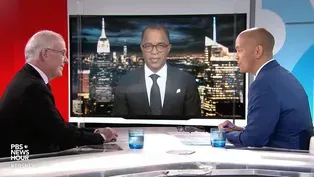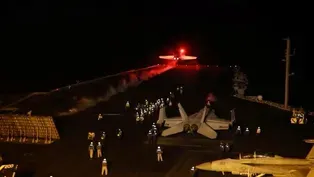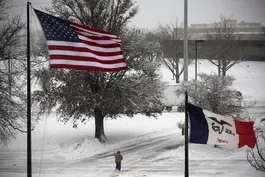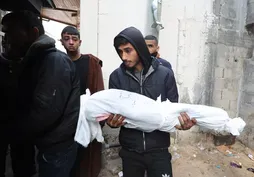
New COVID variant responsible for latest wave of infections
Clip: 1/12/2024 | 6m 55sVideo has Closed Captions
Why experts are concerned about the JN.1 variant responsible for latest COVID wave
The U.S. and other parts of the world are in the midst of another COVID-19 wave. Infections and hospitalizations are on the rise this winter and a new variant is responsible for most of those cases. John Yang discussed these current trends and if the approach to the virus needs to change with Dr. Eric Topol.
Problems with Closed Captions? Closed Captioning Feedback
Problems with Closed Captions? Closed Captioning Feedback
Major corporate funding for the PBS News Hour is provided by BDO, BNSF, Consumer Cellular, American Cruise Lines, and Raymond James. Funding for the PBS NewsHour Weekend is provided by...

New COVID variant responsible for latest wave of infections
Clip: 1/12/2024 | 6m 55sVideo has Closed Captions
The U.S. and other parts of the world are in the midst of another COVID-19 wave. Infections and hospitalizations are on the rise this winter and a new variant is responsible for most of those cases. John Yang discussed these current trends and if the approach to the virus needs to change with Dr. Eric Topol.
Problems with Closed Captions? Closed Captioning Feedback
How to Watch PBS News Hour
PBS News Hour is available to stream on pbs.org and the free PBS App, available on iPhone, Apple TV, Android TV, Android smartphones, Amazon Fire TV, Amazon Fire Tablet, Roku, Samsung Smart TV, and Vizio.
Providing Support for PBS.org
Learn Moreabout PBS online sponsorshipin the midst of another COVID-19 wave.# th e rise this winter.
And a new variant is# responsible for a majority of those cases.
John Yang has the latest and a look at whether# we need to change our approach to the virus.
JOHN YANG: Geoff, the World Health# Organization said yesterday that,## in December, nearly 10,000 COVID deaths were# reported in Europe and the Un ited States, hospital admissions are# on the rise, up 56 percent last week from## the month before.
But they're still far# lower than they were in previous years.
In Europe and the Americas, ICU admissions# are up 62 percent from the month before.
The## director general of the WHO said public# health officials need to be vigilant.
TEDROS ADHANOM GHEBREYESUS, WHO Director# General: Although COVID-19 is no longer a## global health emergency, the virus is still# circulating, changin various sources indicate increasing transmission# during December fueled by gatherings over the## holiday period and by the JN.1 variant, which is# now the most commonly reported variant globally.
JOHN YANG: So, what do these current trends mean?
Dr. Eric Topol is the founder# and director o Research Translational Institute.
He's been# warning about the ri Dr. Topol, how concerned are# you about this current uptick?
DR. ERIC TOPOL, Scripps Research Translational# Institute: Well, good to be with you, John.
I think the main thing h second most throughout the entire# pandemic after Omicron.
And so## while the hospitalizations are not as bad,# and you mentioned already the death toll,## that's reassuring because of some# of the immunity we have built up.
But this virus has evolved, and it's markedly# different than previous an d that's a challenge for the# spread and for the infections## and the potential of long COVID# in many of those people as well.
JOHN YANG: Talk about that evolution.
This new variant, JN.1, is DR. ERIC TOPOL: Right.
there's only been two times when a# variant came along with more than## 30 new mutations in the spike protein.# Usually, a variant has a couple, a few,## but this is -- we call it an Omicron event,# because that was the first time we saw one.
And then, of course, back in the fall, we started# to see the rise of the precursor to JN.1 with## another 30-plus mutations in the spike protein.# And so when you have this many new mutations,## the virus has essentially found a way to work# around, bypass our normal immune response.
And so it gets to be very infectious, easily# getting people who have already been infected,## no less those who have not had COVID# before.
So it's good that we have## four years of built-up exposures# and vaccinations and boosters,## but it's bad that this virus is relentless# in finding ways to basically reinvent itself## and to get into our upper airway and then all the# other potential things that can happen after that.
JOHN YANG: You mentioned long COVID.# You have been very vocal about this,## about the need to understand long COVID,# understand who's at risk for Explain your concerns and also whether# or not repeated infections play any role.
DR. ERIC TOPOL: Right.
COVID.
And the problem, John, with long COVID is,# we don't know who's going to get this.
Over time,## since the beginning of the pandemic,# it looks like the incidence has dropped## some.
And that's partly because# vaccinations are quite protective,## 40 percent or 50 percent reduction of# long COVID, as well as with boosters.
But the problem is, even with vaccinations or# without, some people can have this terrible## long-term problem of their immune system# getting totally out of sorts and having## self-directed antibodies and so many# markers of inflammation across the body,## throughout every organ system, no# less a disabling set of symptoms.
So, even if that is just a couple percent of# people in this current wave, this big global## surge, that's still a lot of people who we have# added to the tens of millions of people currently## suffering from long COVID around the world, and# we don't have any treatment for it.
We know some## things that can prevent it, but we have nothing# yet that's been substantiated to treat long COVID.
JOHN YANG: You had an op-ed column# in The Los Angeles Times last week.
In it, you wrote: "It's crickets# from the White House on COVID now,## with no messaging on getting the updated booster# or masking.
The Biden administration too little to accelerate research on# effective treatments for long COVID."
What would you like to see the administration do?
DR. ERIC TOPOL: Well, a lot more than it's doing.
In the first year of the pandemic,# we saw that Operation Warp Speed,## and we took this virus as an existential# threat and pulled out all the stops.
But, right now, John, we need oral# or nasal vaccines to stop infections,## to stop spread, to be variant-proof,# whatever this virus mutates to in the## times ahead.
And we have a small amount of# funding towards that end, but not enough.
And the messaging has been poor.
That# is, even the people at highest risk,## about 35 percent of them have had the# updated booster that's been available## since September.
That's the highest-risk# people of advanced age.
We had 90,## 95 percent of those same high-risk people getting# the initial primary series of the vaccine.
So we're not doing enough.
We have known this# was coming.
We have seen countries in Europe## that had wastewater levels of the virus that# were unprecedented, even exceeding Omicron.
And## it isn't like they stay -- the virus is going to# stay there.
We knew it was coming since September,## October, and only in recent weeks have health# systems started to get masking back as a policy.
We're just not doing enough to# prepare or manage this big surge.
JOHN YANG: Dr. Eric Topol of the Scripps Research# Translational Institute, thank you very much.
DR. ERIC TOPOL: Thank you, John.
Brooks and Capehart on Iowa expectations, Biden's campaign
Video has Closed Captions
Brooks and Capehart on Iowa expectations and Biden campaign concerns (10m 8s)
Houthis vow revenge after U.S. and U.K. airstrikes in Yemen
Video has Closed Captions
Houthis vow revenge after U.S. and U.K. airstrikes in response to Red Sea attacks (3m 17s)
How U.S. strikes on Houthis could alter Middle East conflict
Video has Closed Captions
How the U.S.-led strikes on Houthis in Yemen could alter the conflict in the Middle East (5m 23s)
Iowa 'kingmaker' on the GOP race and white evangelical vote
Video has Closed Captions
Iowa caucus 'kingmaker' on the GOP race and critical white evangelical vote (8m 54s)
UN agency describes dire humanitarian situation in Gaza
Video has Closed Captions
United Nations relief agency describes the dire humanitarian situation in Gaza (5m 49s)
What's at stake for China and U.S. in Taiwan's elections
Video has Closed Captions
What's at stake for China and U.S. in Taiwan's presidential and parliamentary elections (6m 23s)
Providing Support for PBS.org
Learn Moreabout PBS online sponsorshipMajor corporate funding for the PBS News Hour is provided by BDO, BNSF, Consumer Cellular, American Cruise Lines, and Raymond James. Funding for the PBS NewsHour Weekend is provided by...

















